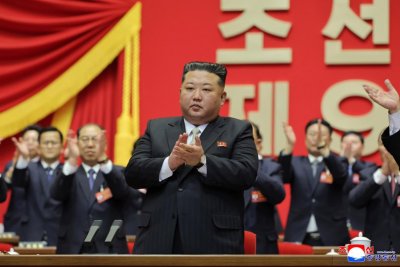[Editorial] Kim declares South no longer ‘fellow countrymen’; is Seoul’s outreach still viable?

North Korean leader Kim Jong Un (C) and officials applauding during the fourth day of the Ninth Congress of the Workers’ Party of Korea (WPK) in Pyongyang, North Korea, 22 February 2026 (issued 23 February 2026). According to KCNA, North Korean leader Kim Jong Un has been re-elected as the general secretary of the ruling Workers’ Party. Photo by KCNA / EPA
Feb. 27 (Asia Today) — Kim Jong Un declared that North Korea would “permanently exclude” South Korea from the category of fellow countrymen and said there was “absolutely nothing to discuss” with what he called the “most hostile entity.”
In a report delivered at the ruling party congress held on Feb. 20-21, Kim warned that if Seoul “damages our security environment,” Pyongyang could take unspecified actions, including threats implying the “complete collapse” of South Korea through nuclear force. The remarks reaffirmed North Korea’s “two hostile states” doctrine and amounted to one of its most belligerent statements toward the South in recent years.
Kim’s speech appeared to directly rebuff the conciliatory approach pursued by President Lee Jae-myung. Upon taking office, Lee outlined three principles for inter-Korean relations: respect for the North Korean regime, no pursuit of absorption-style unification and the exclusion of hostile acts. At the U.N. General Assembly in New York last September, he proposed the “END Initiative,” aimed at encouraging denuclearization through exchanges and normalization of relations.
Seoul has since halted loudspeaker broadcasts along the Military Demarcation Line, suspended National Intelligence Service broadcasts toward the North, made the Rodong Sinmun more publicly accessible and expressed regret over civilian drone incursions. The administration has also sought to restore the Sept. 19 inter-Korean military agreement, a move that has drawn criticism from some within the military and from U.S. officials.
According to reports, Gen. Xavier Brunson, commander of U.S. Forces Korea, conveyed concerns to the chairman of the Joint Chiefs of Staff that restoring the no-fly zone near the border could “constrain the ROK military’s readiness posture.”
Despite these gestures, Kim dismissed Seoul’s stance as a “clumsy deception and a poor performance.” While rejecting dialogue with the South, he left open the possibility of improved ties with Washington, saying there would be “no reason we cannot get along well” if the United States abandons what Pyongyang calls a hostile policy.
The contrast underscores a long-standing North Korean strategy often described as engaging Washington while sidelining Seoul. The editorial argues that Seoul’s current peace roadmap has effectively stalled, with little progress in efforts to leverage improved ties with Beijing to moderate Pyongyang’s stance.
While peaceful coexistence remains a stated goal, Kim’s latest remarks raise renewed questions about whether continued unilateral conciliatory measures can alter North Korea’s strategic calculus.
— Reported by Asia Today; translated by UPI
© Asia Today. Unauthorized reproduction or redistribution prohibited.
Original Korean report: https://www.asiatoday.co.kr/kn/view.php?key=20260226010008101
